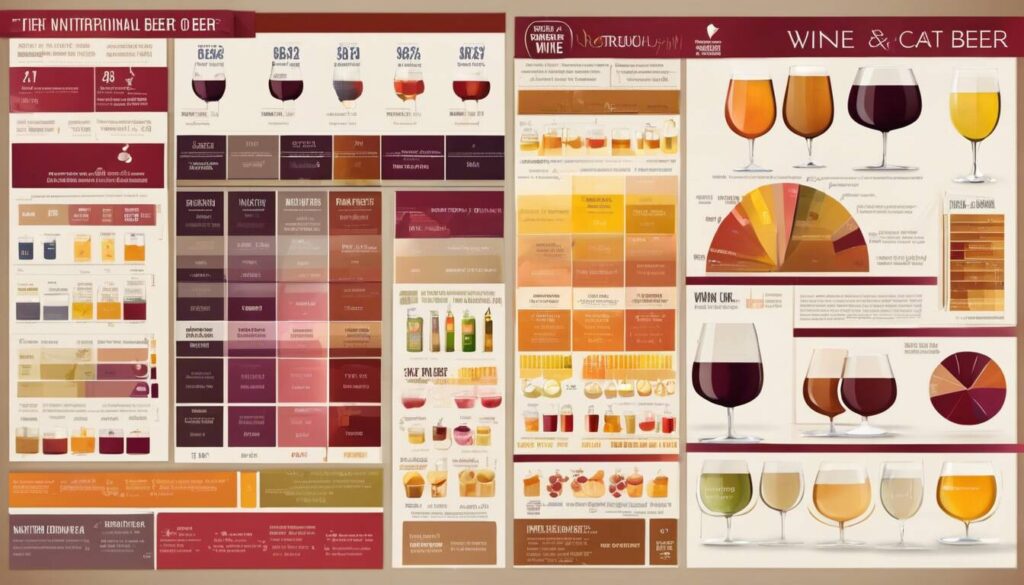When diving into the health effects of tipple choices like wine and beer, there are pros and cons to each. Wine, for instance, especially red, is jam-packed with antioxidants such as resveratrol and flavonoids. These mighty elements defend cells from free radical damage, potentially lowering the onset chance of persistent ailments. Surprisingly though, despite popular belief that these drinks only cause ill effects, moderate consumption, according to research, can indeed offer some health benefits. Now, get ready to delve into the intriguing antioxidant riches found in wine.
The health benefits of wine, particularly red wine, include its potential to lower the risk of heart disease and its antioxidant properties. On the other hand, beer may offer some nutritional benefits such as higher B vitamin content and potential bone density support due to its hops content. However, it’s essential to consume both alcoholic beverages in moderation and consult with a healthcare professional for personalized advice.

Benefits of Drinking Wine
When it comes to wine, there’s often talk about how it might actually be good for you. So, is there any truth to this? Well, let’s just say that the idea isn’t entirely baseless. There are indeed some potential health perks associated with moderate wine consumption.
Antioxidant Power
Let’s begin with antioxidants. Wine, especially red wine, is known to contain powerful antioxidants such as resveratrol and flavonoids. These compounds are like little warriors defending your body’s cells against potential damage caused by free radicals, which could help reduce the risk of chronic diseases too! It’s like sending in a team of superheroes to protect your health—pretty cool, right?
In practical terms, when you enjoy a glass of wine, you’re potentially giving your body a boost of these beneficial compounds. It’s important to remember that moderation is key; overindulgence in any form can negate the positive effects of these antioxidants.
Just think of it as a small step towards protecting yourself from harm, while also treating yourself to a relaxing drink at the same time.
Heartfelt Health
Another interesting aspect closely associated with wine consumption is its potential impact on heart health. The alcohol and antioxidants present in red wine, in particular, are believed to work together to promote good heart health.
Research suggests that moderate consumption of red wine might contribute to a lower risk of heart disease. How so? Well, it seems that these magical antioxidants help by increasing levels of good cholesterol (HDL) and preventing artery damage. That’s pretty amazing—it’s like a little cheers to your heart every time you savor a glass of red!
Of course, it’s essential to emphasize the importance of moderation here. The goal isn’t to drink as much as possible for the sake of good health, but rather to enjoy it responsibly.
Nurturing Your Noggin
And let’s not forget about the potential cognitive benefits associated with moderate red wine consumption. Some studies have indicated that the antioxidants found in red wine could be linked to improved cognitive function and a reduced risk of certain neurodegenerative diseases.
So, raising a glass of wine may not only be a delightful social activity but could also have long-term advantages for our brain health! It doesn’t mean we get to forget all our troubles after one glass, but it’s definitely an interesting thought to consider.
With these potential benefits in mind, it’s clear that wine has more to offer than just being a beverage for enjoyment. But keep in mind, it’s always best enjoyed in moderation to truly reap these potential rewards.
As we’ve seen the potential benefits of moderate wine consumption, let’s now take a closer look at the surprising benefits of beer drinking.
Benefits of Drinking Beer
When it comes to health benefits, beer has some unexpected advantages. One of the most remarkable benefits is its potential to contribute to bone health. Beer contains a dietary element called silicon, which is considered beneficial for bone density. This means that moderate consumption of beer could potentially lower the risk of osteoporosis and improve bone strength.
Additionally, beer isn’t just a source of relaxation after a long day; it also provides essential nutrients such as protein, fiber, and B vitamins. These components are critical for overall health and well-being. Furthermore, moderate consumption of beer may have positive effects on cholesterol levels and inflammation, further contributing to its potential health benefits.
“The presence of essential nutrients in beer offers a surprising edge when it comes to making choices about our diet.”
While the health benefits of wine are often celebrated, the nutritional content of beer presents some surprising advantages as well. Now, let’s take a closer look at how the nutritional content of both beverages stacks up.
Nutritional Content of Wine and Beer

When deciding between a glass of wine and a bottle of beer, comprehending their nutritional content can be valuable. Let’s take a closer look at the key differences.
Caloric Content
Beer tends to have a higher calorie count compared to wine. On average, a 12-ounce serving of beer contains about 153 calories, while a 5-ounce serving of wine contains around 125 calories. However, it’s essential to note that these values can vary widely depending on factors such as the type and brand of each beverage.
Light beers may have fewer calories, typically ranging from 90 to 120 calories per 12-ounce serving, while darker beers generally contain more calories, ranging from 170 to 240 calories per 12-ounce serving. Meanwhile, the calorie content of wine can also differ based on the type and color. For instance, rose wine has approximately 70-80 calories per 100ml, white wine contains around 73-83 calories per 100ml, and red wine ranges between75-85 calories per 100ml.
Carbohydrates and Sugar
Apart from calorie content, it’s important to consider the carbohydrate and sugar levels in both beverages. Generally, beer contains more carbohydrates and sugar than wine. This distinction could be significant for individuals who closely monitor their carbohydrate intake, such as those following a keto diet or managing diabetes.
For example, light beers usually have between 3 to 6 grams of carbohydrates per 12-ounce serving, while non-light or regular beers can contain around 10 to 20 grams of carbohydrates in the same serving size. Conversely, wine typically has fewer carbohydrates and sugar than beer. A standard 5-ounce serving of wine contains approximately 3-4 grams of carbohydrates with little to no sugar. These differences can influence one’s dietary choices based on specific health or lifestyle preferences.
Understanding these nuances in their nutritional content can assist in making informed decisions when it comes to choosing between wine and beer. But wait, we’re just scratching the surface—let’s proceed further into the intricate world of nutritional comparison and uncover more findings that may shape your future libation choices.
Health Effects of Moderate Consumption
When discussing health effects, it’s crucial to understand that the focus here is on moderate consumption, meaning not exceeding the recommended limits set at a maximum of one drink per day for women and two drinks per day for men. Now, let’s explore some of the potential health benefits associated with moderate consumption of both wine and beer.
Cardiovascular Health
Research suggests that moderate consumption of both wine and beer may offer potential benefits for heart health. Both beverages contain compounds like polyphenols, which are antioxidants that can help protect the lining of blood vessels in the heart. Red wine, in particular, has been linked to a higher level of HDL (good) cholesterol and a lower risk of heart disease due to its polyphenol content. On the other hand, certain types of beer also contain antioxidants derived from barley and hops, which may contribute to similar cardiovascular benefits.
Furthermore, both wine and beer have been associated with reducing the risk of heart disease and stroke when consumed in moderation. It’s important to note that these benefits are primarily observed in moderate drinkers; excessive consumption can lead to negative health outcomes.
Longevity
Studies have also indicated that moderate alcohol consumption, regardless of the type of beverage, may be linked to increased longevity and overall health compared to heavy drinking or abstaining from alcohol entirely. This finding does not favor wine over beer or vice versa; instead, it highlights the potential positive impact of moderate alcohol consumption on longevity.
It’s essential for individuals to weigh these potential benefits against their own health risks and make informed decisions about alcohol consumption based on their personal circumstances. The key takeaway is that moderation is paramount when considering any potential health benefits associated with consuming wine or beer.
In navigating the realm of alcoholic beverages and their potential impacts on our well-being, we’re now poised to delve deeper into the comparison between wine and beer in terms of their overall influence on health.
Which is Healthier: Wine or Beer?
When it comes to the health benefits of these two popular alcoholic beverages, it’s not a simple matter of picking one over the other. Various factors need to be considered, such as their nutritional content and how they interact with the human body. Let’s take a look at how wine and beer measure up in terms of their potential health benefits.
Beer and Wine Content Comparison
Firstly, let’s compare their contents to understand where any potential health benefits come from. It’s informative to know that some beers contain hops approved by Germany’s Commission E to treat restlessness, anxiety, and sleep disturbances. On the other hand, red wine contains polyphenols like resveratrol and flavonoids linked to various health benefits. The presence of these compounds in both beer and wine paves the way for potential positive effects on health. Beer has a higher nutritional value than wine, containing protein, fiber, B vitamins, folate, and niacin. Some studies suggest that hops may inhibit obesity and increase bone mineral density. However, red wine is lower in calories compared to beer and contains potassium and fiber. Small doses of resveratrol in red wine have been found to have anti-aging effects.
Imagine enjoying a glass of good quality red wine—the delightful aroma, the rich color swirling in your glass—yet consider savoring your favorite craft beer: the crisp freshness hitting your palate, the earthy bitterness lingering on your tongue. Each experience has its own unique charm, but from a health perspective, which one offers more advantages?
Individual Differences Matter
It’s important to remember that individual factors play a significant role in determining which beverage might be better for an individual’s health. An individual’s overall diet, lifestyle choices, and existing health conditions can impact how their body responds to alcohol consumption. For example, while some people may experience migraines triggered by red wine, others may find them more manageable when consuming beer instead.
The Verdict
The decision isn’t clear-cut since different people will experience different effects from consuming wine versus beer. One could argue that beer offers certain nutritional benefits that are not found in wine; however, this does not discount the potential health benefits associated with red wine.
Rather than pitting them against each other as direct competitors in the arena of healthiness, it’s crucial to consider each beverage within the context of an individual’s overall lifestyle and health factors. What works for one person might not work for another; it’s all about finding balance and moderation when enjoying either option.
The nuanced relationship between wine and beer’s health impacts often leads to common misunderstandings. Let’s now explore these misconceptions about their health benefits.
Misconceptions About Wine and Beer Health Benefits
It’s easy to fall for the allure of media headlines praising the potential health benefits of wine and beer. After all, it’s been said that a glass of wine a day keeps the doctor away, right? But let’s take a closer look. Misleading Claims about the health benefits of wine and beer can often stem from exaggerated or misinterpreted studies. When one small study shows a potential benefit, it doesn’t mean that drinking more will bring about the same effect. It’s crucial to critically evaluate the sources of health information and consult healthcare professionals for personalized advice.
Often, news articles pick up on a single study and present its results as the ultimate truth without considering the full body of research on the subject. For instance, while one study may suggest that certain compounds in red wine have heart-healthy benefits, it’s important to consider all available research, especially when there are conflicting findings. Only then can we gain a more accurate understanding of the potential health effects of these beverages.
Here’s something interesting to think about: Just because a study suggests something interesting about a substance in wine or beer, it doesn’t mean you should start consuming more of it. Moderation is key.
For example, some studies have highlighted resveratrol, found in red wine, for its potential heart-protective effects. However, the amount of resveratrol in a typical glass of red wine is quite small, and the same compound can be found in non-alcoholic sources like grapes and berries.
Also, researchers often find that lifestyle factors heavily influence health outcomes. Overall Lifestyle plays a crucial role here: while moderate consumption of wine or beer can be part of a healthy lifestyle for some individuals, it should not overshadow other key aspects such as maintaining a balanced diet, regular physical activity, and routine healthcare check-ups.
In many cases, previous research related to the health benefits of alcohol lacked consideration for other lifestyle factors that contribute to better health among light or moderate drinkers. This is why it’s important to view alcohol consumption in the context of an individual’s overall lifestyle.
By unpacking these misconceptions and considering the broader context of our overall health and well-being, we can make informed decisions about how wine or beer fits into our lives. Remember, balance is key — no single beverage alone can replace the importance of maintaining an overall healthy lifestyle.
If you are looking to explore wines further and find some delightful options to complement your balanced lifestyle, consider checking out our selection at Wine Uncovered. Support us at our merch shop!

